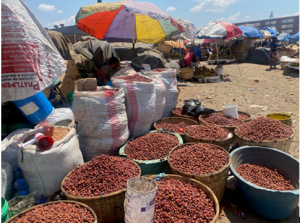Gone are the days when African rural areas were associated with backwardness. With many indigenous food commodities like wild fruits and tubers from rural areas commercializing themselves through African territorial markets, many Africans who care about health and wellness are relocating to rural areas and the countryside from cities. Who wants to live in an area where refuse is not collected and water is contaminated with chemicals and industrial waste? In addition to lower cost of living, rural areas are becoming famous for better mental well-being provided by forests, mountains and open spaces. By promoting health food and diverse forms of wellbeing, agroecology is giving rural areas a new positive image different from conventional stereotypes.

Toward a new food systems leadership
Agroecology is silently influencing the evolution of new environmentally-conscious leaders who are determined to move away from industrial agriculture to uniquely Africanist food systems. Such leaders will re-organize land use patterns to prioritize indigenous commodities, most of which are gaining traction on the global market through tourism. Large-scale farms and monoculture estates that were used in colonial times to displace indigenous food and turn Africans into labourers will start producing more indigenous commodities with less dependence on imported seed, chemicals and equipment. Another significant reversal of the colonial mentality is being witnessed in the formal education system where Indigenous Knowledge Systems (IKS) are fast replacing imported knowledge in school curricula and university education.
Having witnessed the negative consequences of depending on imported food systems and external knowledge, by 2040, the young generation of leaders will have made meaningful progress in transforming the whole African food systems landscape toward recognizing and utilizing IKS in promoting indigenous food systems. Embracing imported knowledge at the expense of IKS has prevented African countries from investing in appropriate processing and preservation technologies for indigenous food systems like wild fruits, small grains, tubers, sweet potatoes, edible insects, indigenous livestock like poultry, goats as well as game meat. Most existing technologies and academic knowledge have focused on processing exotic products for purposes of supplementing western food baskets as well as changing tastes and preferences of African consumers, thus expanding the demand landscape or markets for exotic products. Limited investment in appropriate technologies has also been a strategy by external investors to continue selling raw commodities that fetch very low prices. But the same commodities are then processed and sold back to African countries at more than 10 times the price of raw materials.
The tables are turning
The rising profile and recognition of rural areas is raising interest among the young generation to learn about food systems in each African community which is adapted to local populations. This is enabling many Africans and foreigners to rediscover their tastes and preferences in favour of diverse foods and cuisines. Riding on growing interest in indigenous food, the new generation of food systems leaders will invest in assessing nutrition within indigenous food like wild fruits, herbs and tubers. That will trigger investment in appropriate rural technologies like juice extractors for use in extracting juice from Masawu, Mazhanje, Matohwe, Gang’acha and others – putting indigenous commodities at the centre of rural business units and entire rural development strategies.
Imagine indigenous food dominating food aid programs
The biggest growth opportunity is in how a lot of indigenous food is now being more preferred in foreign markets. African leaders just need to have the political will to invest in IKS for sustainably producing indigenous food for local consumption and exports. If sufficient attention is paid to what matters, by 2040, bumper harvests of indigenous food will see development organizations building warehouses for indigenous food. Such food will begin to dominate food aid programs. The composition of food aid determines which producers benefit from supplying food to food aid interventions. Instead of continuing to be a market for food aid, African countries will be a major source – reversing the trend where Western producers have been the main source of food aid food for decades. Governments and their development partners will also start investing in developing and preserving indigenous fruits which are a major nutrition source during drought years.
Changing the narrative through communities and learning institutions
Rather than continue riding on imported knowledge, the onus is on Africans, through academia, to invest in IKS. The current idea of promoting improved seed varieties is intended to create a market by continuously toying with varieties and producing new ones. If private seed companies were really committed to eradicating food insecurity, by now they would have produced diverse seed suitable for drought-prone districts. They would not be stigmatizing small grains by associating them with dry regions. The new food systems leadership will also reverse the current trend where government extension officers have been brain-washed into suppressing IKS and promoting imported knowledge. African researchers and academics will start indigenous seed houses that specialize in indigenous seeds, wild crops and wild animals. The same way guinea fowls have been domesticated from the wild will see communities and learning institutions domesticating wild animals sustainably. There will be livestock ranches for indigenous chickens and greenbelts for traditional grains and indigenous pastures. Transforming and capacitating leadership mindsets should start from academic systems which are the main sources of policy makers and advisors with capacity to review curricula, generate, analyse and interpret IKS that is critical for reversing the current food systems. Useful knowledge will no longer be put in academic journals for narrow audiences. The new leaders will also address the current dilemma where experts have been working in silos in the same communities with IKS mainly for academic purposes. Experts and fellows will start using their expertise in working with communities who are the source of IKS which is critical for transforming the food system. Trade promotion bodies like ZIMTRADE will have a strong desk responsible for promoting indigenous commodities which do not even need complicated standards like global gap.
Charles@knowledgetransafrica.com / charles@emkambo.co.zw /
Website: www.emkambo.co.zw / www.knowledgetransafrica.com
Mobile: 0772 137 717/ 0774 430 309/ 0712 737 430
